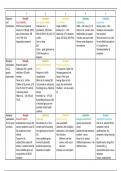Summary
Summary AQA A-level Psychology Schizophrenia Evaluation Notes
This document is a short-hand summary of AO3 evaluation points for the whole AQA A-level Psychology Schizophrenia topic such that an 8/16-marker could be written on any topic. To aid memory of these points, the notes are partially coloured, and they are in grid/table format.
[Show more]




